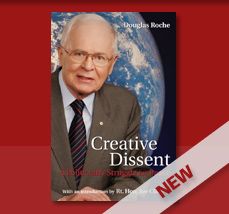It was a frustrating, but teachable moment. Douglas Roche, veteran campaigner for nuclear disarmament was in the middle of a PowerPoint presentation at Dalhousie University in Halifax last Thursday when Windows Vista suddenly started downloading updates and then, shut down. Roche frowned in dismay as the projector screen went blank.
"It just crashed," he said dryly, adding that the world's 23,360 nuclear weapons are controlled by computers. "There have been all sorts of accidents due to computer malfunctions. We live in a fool's paradise if we think the technical safety of nuclear weapons is assured."
Roche quoted former United Nations Secretary-General Kofi Annan’s statement that the world is sleepwalking toward nuclear disaster. He added: “The risk to the world of not getting rid of nuclear weapons is unimaginably high.” Roche predicted that if there is no disarmament in the coming decades, nuclear weapons will proliferate, and if 20 to 40 countries have them, a nuclear war would become a "mathematical certainty."
Roche, a former Senator, Member of Parliament and Canadian Ambassador for Disarmament, was conducting a seminar sponsored by Dalhousie's Centre for Foreign Policy Studies in coordination with the Halifax Peace Coalition. His title was upbeat: "A New Hope: Obama & The End of Nuclear Weapons."
He began by saying he finds Barack Obama fascinating. "I'm not here to canonize him," Roche said. "I don't believe Obama walks on water, but he is something new."
After studying Obama's writings and speeches, Roche is convinced that the American president is genuinely committed to nuclear disarmament. As one example, Roche pointed to Obama's speech in Prague last April in which he pledged that "the United States will take concrete steps toward a world without nuclear weapons." Obama also became the first U.S. president to preside over a meeting of the United Nations Security Council in September --- a meeting that adopted a formal resolution calling on the world's most powerful nations to "create the conditions for a world without nuclear weapons."
"This was totally unexpected for an American president," Roche said adding that the U.S. under George W. Bush had turned away from its obligations under the Nuclear Non-Proliferation Treaty (NPT) to negotiate nuclear disarmament with other countries that possess nuclear weapons. Roche pointed out that the NPT, which was renewed indefinitely in 1995, is a bargain under which nuclear weapons states pledge to work toward getting rid of their nuclear weapons, while non-nuclear nations agree not to acquire them. Only three countries, India, Pakistan and Israel, have refused to sign the NPT. North Korea did sign, but later withdrew.
Roche said Obama is up against strong opposition from prominent Americans who believe nuclear weapons deter attacks.
"They [nuclear weapons proponents] have a mind-set that nuclear weapons are an instrument of peace when it's quite the reverse. We saw that in Hiroshima and Nagasaki," Roche said.
"Obama brings a vision of a nuclear-weapons-free world. But he's up against establishment thinking that is used to the culture of war, while Obama is a representative of a culture of peace."
During the question period, Roche was asked how he squares his idea that Obama is a man of peace with the U.S. president's announcement that he's sending another 30,000 soldiers to fight in Afghanistan.
"I myself do not like the escalation," Roche replied. "I understand Obama. He was between a rock and a hard place. At least he is not going into an open-ended war," he added referring to Obama's promise to start withdrawing U.S. forces from Afghanistan 18 months from now in July 2011.
Roche said that in two years, Obama will either be seen as a hero, if he manages to withdraw American forces or a “monumental failure” if he doesn’t. He suggested the success or failure of Obama’s presidency may depend on his gamble that he can pull the troops out.
“Will it work or will it not? I don’t know.”



